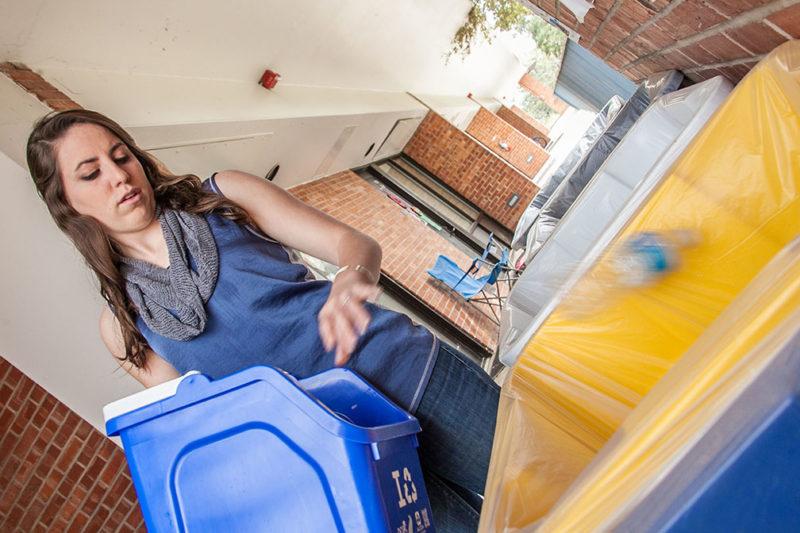Trinity participates in annual event that promotes waste awareness
Since 2008, Trinity has participated in RecycleMania, an annual event that helps schools across the country improve efforts to reduce waste on their campuses. For the next eight weeks, Trinity will promote vigilance and awareness of the effects of waste on the environment.
During the event, schools focus on waste management and waste reduction. The ultimate goal of RecycleMania is to fare better than the other schools participating; however, the office of campus planning and sustainability intends to focus more on the benefits of the event on our campus.
“One of the goals of RecycleMania is waste minimization. People are so used to seeing Reduce, Reuse, Recycle, but it’s actually a hierarchy. The goal is that first, you reduce your waste, then you try to reuse your waste, then you recycle what’s left and if you have a compost program, the next step is rot, and the last option is landfill,” said Sharon Curry, director of sustainability.
To improve Trinity’s waste diversion percentage, signs are being hung by the waste centers in residence halls. Each sign displays the weekly percentage of each hall and will be updated throughout the event.
“Instead of beating other universities, we’re trying to improve our recycling rate on campus rather than thinking of ourselves in relation to the other schools. It’s sort of like a Trinity competition right now,” said Lillie Marquez, one of the sustainability assistants.
Percentages are the total number of pounds of recycling over the total pounds of trash per buildings. The columns on the posters are grouped by how they’re picked up and makes keeping track of the numbers easier.
“We compete to see how we rank with other schools, but the real goal is to get people to start recycling because we’re competing, and hopefully they develop habits. It’s more to get people to keep recycling in mind and to have a goal accomplished,” said Ian Witecki, the other sustainability assistant.
Although Trinity is compared to schools of a similar size, some schools that allow students to live off campus have a higher percentage of waste diversion.
“It definitely changes if you have people living on campus because they’re there full time, and they generate more waste. If you’re just going to class, you’ll recycle a plastic bottle, but if you’re living on campus, you may be lazier,” Marquez said.
Last year, Trinity maintained a 16.89 percent recycling rate, and the goal is to reach 20 percent this year. Although the rate has been relatively steady over the past eight years, ranging from four percent to just under 20 percent the office of campus planning and sustainability hopes to improve the rates more drastically.
“We got 16th most improved last year, which is really good. If we improve our past rate by 20 percent, we’ll reach our goal of 20 percent,” Witecki said.
Although RecycleMania focuses on improving recycling rates on campus, the overall intention is to reduce waste, including food waste.
“We got 16th most improved last year, which is really good. If we improve our past rate by 20 percent, we’ll reach our goal of 20 percent,” Witecki said.
Although RecycleMania focuses on improving recycling rates on campus, the overall intention is to reduce waste, including food waste. The office of campus planning and sustainability acquired posters to promote this reduction of food waste that are now hung in Mabee Dining Hall.
“It’s just information, awareness. We can’t force anyone to change behavior, but we can ask people to consider their behavior by putting the facts before them and letting them make informed choices,” Curry said.
Although Trinity does compost pre-consumer waste, such as prep scraps and coffee beans, there is no viable post-consumer compost program on campus because there is not the space that vendors require to do so.
“The fact that 40 percent of food ends up in landfill is appalling. The posters may not seem like much, but anything we can do to change that is a good thing,” Curry said.
There are many things that people recycle that are not recyclable and ultimately hurt the system. If there are too many contaminants in a load of recycling, it will be landfilled instead.
“A lot of people in our industry call it wishful recycling. They wish it was recyclable, so they put it in the bin, but it doesn’t help if you do that. If we get enough contamination in the bins, we actually divert it to the compactor for landfill in order to protect our recycling stream,” Curry said.
Trinity’s office of campus planning and sustainability doesn’t have the staff or space to sort out the contaminated recycling, and vendors will reject a load that contains too much contamination, so to avoid penalties that come with contaminated recycling, the office diverts it to the landfill instead.
Examples of contamination are plastic bags, Styrofoam, aluminum foil, hangers, and coffee cups. Although some are recyclable, we do not accept them as recycling on campus because they will cause problems with the recycling machinery or because they are contaminated with food or liquids.
“Our focus is not to get recycling to the highest possible rate, but to get waste to the lowest possible rate. It’s great that we recycle, but it’s better if we don’t create the waste at all,” Curry said.
The office of campus planning and sustainability will be promoting RecycleMania by hosting Milk and Cookies on March 2 and March 9 and by serving tea in reusable cups outside of the Witt Center on Thursdays at 3 p.m. For more information, email turecycles@trinity.edu, or visit recyclemaniacs.org.







